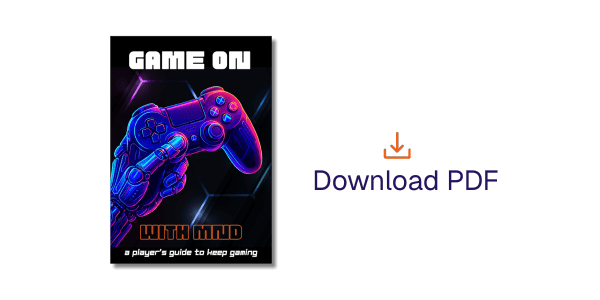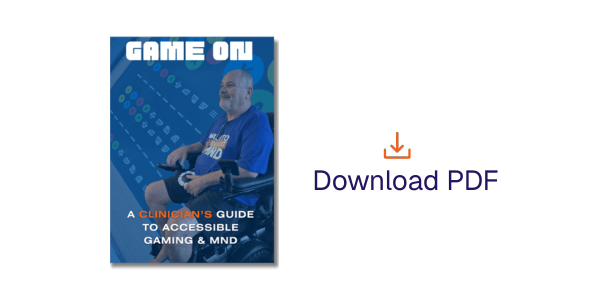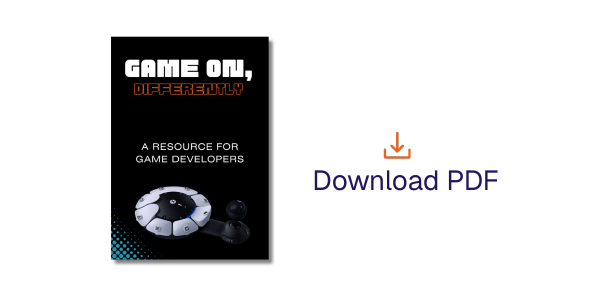Many people enjoy playing video games—whether it's for fun, relaxation, connecting with others, or keeping the mind active. If you have MND, you might wonder if gaming is still possible as things change.
The good news is that gaming can continue to be a great part of life with MND.
Playing video games can be a great way to have fun, connect with loved ones online and in real life, and keep your mind active, healthy and engaged.
Gaming helps bridge loneliness and lack of community issues – that makes it an invaluable life aid for me. Did I mention I can RUN in games? ‘Nuff said!
– Rob, living with MND
As MND progresses, you might find that certain games or controls become tricky. But there are lots of ways to modify your setup and environment to stay comfortable and supported. You might:
- Adjust your chair and desk height
- Use mounts or stands to position devices within easy reach
- Manage lighting and reduce distractions in your gaming space
These small changes can help make gaming more enjoyable and reduce strain.
Many modern games offer fantastic built-in accessibility settings that can make playing easier. Depending on the game, you might be able to:
-
Change the difficulty level
-
Customise controls and button layouts
-
Turn on subtitles or visual cues
-
Use auto-aim or assistive modes
Exploring these options can really personalise your gaming experience to suit your needs.
If you need extra help with physical controls, there are a range of adaptive technologies that can open up new ways to play, such as:
- Adaptive controllers that require less strength or movement
- Switches that let you control games with simple presses or taps
- Eye gaze technology for playing using just your eyes
- Voice-controlled devices that let you interact without needing your hands
Your allied health team can help you explore which options might work best for you.
Your allied health team—like occupational therapists, physiotherapists, and speech pathologists—can provide expert advice and support to help you keep gaming comfortably and safely. They can assist with:
- Managing symptoms that affect gaming (like muscle weakness or fatigue)
- Recommending and trialling adaptive controllers, switches, and devices
- Modifying your setup and positioning to reduce strain
It’s always worth chatting with your team about your goals and the things you love doing—including gaming!
Our free ebook, Game On with MND, is packed with practical tips, personal reflections, and tools to help you keep gaming. It covers:
- Choosing the right games and equipment
- Using assistive technology
- Staying connected with the gaming community
- You can download the ebook as a pdf or read it in flipbook format below.
Remember: Everyone’s experience with MND is different, and gaming can be adapted to suit you. If you need help finding the right setup or tools, talk to your MND advisor or care team.
Game On ebooks
As part of the 'Game On' project, funded by FightMND, we worked in collaboration with MND Queensland and people living with MND, to create resources to support people with MND, and their allied professional team, to keep playing, connecting and thriving through gaming.
Below are three ebooks, available to view in a flipbook or freely download as a pdf.
Game On with MND – Gamer Resource: A guide to continuing gaming with MND, including real-life stories, accessibility strategies and tech tools.
Game On – A Clinicians' Guide to Accessible Gaming and MND: Evidence-informed tips for health professionals to support clients in gaming safely, meaningfully and independently.



.png)
.png)
.png)